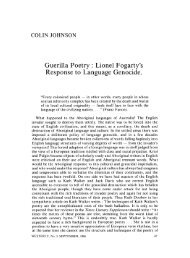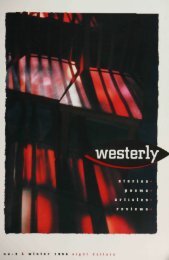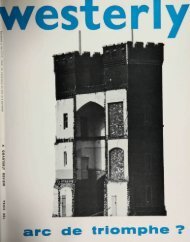John K. EwersTHE GENIUS OF JUDITH WRIGHTBefore attempting to come to terms withJudith Wright's latest volume. The Other Half(Angus & Robertson, Sydney, 1966, $1.95), Ipropose, first to take a brief sampling of whatcritics and reviewers had to say about herearlier work as it appeared, and then to examineit in more detail as a whole. This willenable us to estabhsh her poetic background,to mark some common factors to be found inall her poetry and the differences that emergefrom time to time.Much credit is due to C. B. Christesen, editorof Meanjin in which a number of her poemshad already appeared, for publishing her firstbook. The Moving Image (1946). This broughtnothing but praise from the critics. ProfessorS. Musgrove said: "This book confirms whatwe have for some time suspected from JudithWright's periodical pieces, that she is the onlypoet among the younger Australians who canchallenge the stature of R. D. FitzGerald.''^Nan McDonald, herself a poet, wrote: "Afterwading through many books of verse whereonly a faint glimmer of poetry haunts the bogof words, the reader can ask nothing betterthan to be dealt the old famihar blow thatsays, beyond all shadow of doubt, 'This ispoetry'. Judith Wright's first book. The MovingImage, does that."- Woman to Man (1949)was no less enthusiastically received. By thetime H. M. Green had published the secondedition of his anthology. Modern AustralianPoetry, in 1952, he was prepared on the evidenceof these two volumes alone to place her"among the principal poets writing in Englishtoday".^ Still confining himself to these twobooks. Green amplified this further in his AHistory of Australian Literature, Vol. 2, 1923-1950: "A couple of lines that certainly andseveral whole poems that probably belong toworld literature; half a dozen poems that areamong the best of their kind in the presentday: it is an amazing production for a womanof thirty-five, and it fixes Judith Wright's position,alongside those of FitzGerald and Slessor,among the first of Uving poets, in Australia orelsewhere."*There was less enthusiasm for the thirdvolume. The Gateway (1953). Elyne MitcheUregretted that the language and the imagerywere "similar to those recording the spiritualjourneys of other poets",^ and T. Inglis Moorefound "a relaxing of the high tension, a recurringsense of uncertainty, a feeling that thepoet has stopped on her path to look around,unsure of her way".^ About the fourth volume.The Two Fires (1955) the critics themselveswere divided. Someone writing inSoutherly, No. 2, 1956, with the initials of J.T.declared that many poems "lend colour to asuspicion that the author is forcing her art".He even went so far as to suggest that "halfbakedcritics or importunate publishers mayhave hurried this fine poet into putting out afourth book before she was ready to do so".^But Robert D. FitzGerald (who is certainlyno "half-baked critic") after commenting onthe changing direction shown in this new volume,said "the earUer impressions return ofpoetry that has almost everything we could askof it", adding later that "one is continuouslyconscious of a power of vision beyond theordinary sight of mankind".* In the finalchapter of his History already referred to—achapter bringing the record up to 1960—H.M. Green amended his previously expressedopinion that Judith Wright was "essentiallylyrist rather than intellectual".^ This- he said,no longer held, for her third and fourth booksshowed her "moving inward, less often makingher vision concrete and lyrical with picturesand lovely images and more often realizingsome inner experience". He conceded that thisshowed "her poetic attitude is not static, an42 WESTERLY, No. 1, MARCH, 1968
important thing for a writer who has alreadymade so high a place for herself''.^"Judith Wright's fifth volume was Birds(1962). F. H. Mares in The Australian BookReview said: "These are beautifully wroughtsmaU poems: I had hoped for a great dealmore, and I fear a withdrawal here.''^' Thereis a tendency, it seems, for the contemporaryreviewer to anticipate what the writer may donext and to be disappointed when his ownanticipation is not fulfilled. It was timely thereforethat these five volumes should be followedby two selections, each made by the poet herself,so that we could get the flavour of herwork as a whole up to that point. The first ofthese was in Angus & Robertson's AustralianPoets series and appeared in 1963, to be followedby a rather fuller selection, Five Senses, in1964. Both contained some poems under theheading of "The Forest" not previously publishedin book form, of which more will besaid presently.This then was the position as far as somecritics and reviewers saw it up to the publicationof her latest volume of new work. TheOther Half. It was clear that all were agreedthat Judith Wright was a poet of considerablestature, but not all were prepared to concedethat her genius had not sometimes faltered inher six published volumes (seven, if we count"The Forest" poems which occur for the firsttime in the two volumes of selections).I have now spent some weeks reading atleisure Judith Wright's entire published poemsin an attempt to distil from them some unifyingessence. When met again after many years,a number of poems in her early volumesassumed, for me, the classic quality of memorableness.What I wish to convey by this is thatapparently these poems had at earlier readingsentered into my subconscious to a degree Ihad not realized. Others familiar with thisauthor's work, attempting a similar exercisein re-acquaintance, would no doubt share thisexperience and be prepared to name furtherpoems which produced a similar effect onthem. Among those which came to me in there-reading with the force and familiarity ofold and well-tried companions were "Nigger'sLeap: New England", "BuUocky" and "Southof my Days" from the first volume, "Womanto Man", "Woman's Song", "Woman to Child"and "Lost Child" from the second, "Birds"and "Old House" from the third, and the titlepoem from the fourth. There were others wherethe impact of familiarity was also present butto a lesser degree. This is a very subjective approachand mere memorableness for any individualis not necessarily a virtue. When it iscoupled with the undoubted quality which suchpoems possess and when it is shared with agreat number of other readers—as I believe istrue of Judith Wright's work—it means a greatdeal.One of the strongest impressions I receivedwas the relationship much of her work bearsto the time it was written. This can be a disadvantage;it can make for ephemeral workif the poet is too closely a victim of her time.But Judith Wright manages to transcend theephemeral where many a lesser poet has beenengulfed by it. This is well illustrated by themood of most of the poems in The MovingImage. This was published in 1946, but allthe poems except one are grouped under theheading: Poems, 1940-1944; that is, they werewritten during World War II. The title poemis undated, but it could be regarded as a warpoemwith its overtones of destruction, althoughit is much more than that in its fullimplications.World War II was a time when Australia'ssurvival as a nation in the Pacific received itsfirst full challenge and this evoked a great dealof inward-looking. We might not last long, thetime seemed to say. What are we? How farhave we come? The year before the outbreakof war had seen the announcement of theJindyworobak manifesto by Rex Ingamellswho gathered around him a group of nationalisticpoets whose talents (many of themlimited) drew also upon this inward-lookingfostered by the threat to survival. Writers inthis group over-stressed background and localcolour, and aroused a good deal of hostilityin certain quarters. Judith Wright was neverclose to the movement, but when asked by itsfounder to contribute to a review of its achievementsat the end of 10 years she offered acomment that was untouched by the rancourthat coloured the criticisms of many others."The Russian, the English, the Norwegianwriter can concentrate his attention on thesocial or psychological problem in hand; hisbackground is already filled in, taken forgranted" she wrote in an article called Perspective."But the Australian background,WESTERLY, No. 1, MARCH, 1968 43
- Page 1 and 2: westerlyA QUARTERLY REVIEW PRICE 60
- Page 3: westerlya quarterlyreviewEDITORIALC
- Page 6 and 7: Some JOURNALS published byUNIVERSIT
- Page 8 and 9: "WeU, maybe this one is, too.""With
- Page 10: a leer. What really infuriated her
- Page 13 and 14: Guest of honour? No less than the G
- Page 15 and 16: THE NAVIGATORS(To Albert Tucker)Bei
- Page 17 and 18: Mother of navigators.Beater of men.
- Page 19 and 20: Horizon-haunted men.Looters and Pir
- Page 21 and 22: On the table Taki had left a crumpl
- Page 23 and 24: FEARA thousand, thousand stars and
- Page 25 and 26: Judith ClarkeTHANK YOU MRS. GREENBE
- Page 27 and 28: Oh no, thought Lai Chandra, oh no.
- Page 29: "Nuance," she said- and "poetry,"an
- Page 32 and 33: TO WAKE, TO FLOWfor my wifeFor me t
- Page 34: With apparent indulgence Lola encou
- Page 39 and 40: or another, and some of the paintin
- Page 41: I do not think it has been fulfille
- Page 47 and 48: from which she herself had sprung.
- Page 49 and 50: They are looking for him now in the
- Page 51 and 52: departure from what had come to be
- Page 53: ary degree the atmosphere of a trib
- Page 56 and 57: Blessed is the mother with her chil
- Page 58 and 59: IF YOU DON'T KNOW HOWDON'T DO ITft>
- Page 60 and 61: And yet perhaps both men drew from
- Page 62 and 63: other respects his attitude was mor
- Page 64 and 65: clearing and, as they are usually t
- Page 66 and 67: WHAT IS THECRITIC?The Critic is a c
- Page 68: JOHN KEATSBronze cast from a life m







